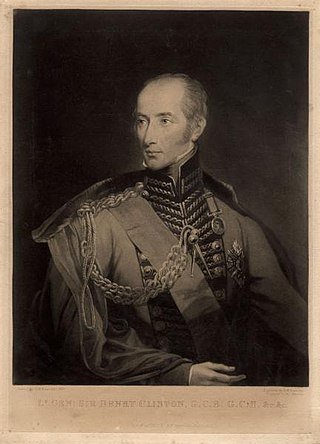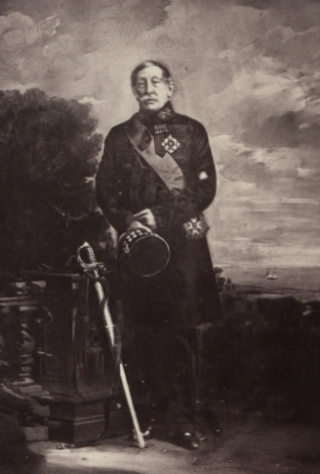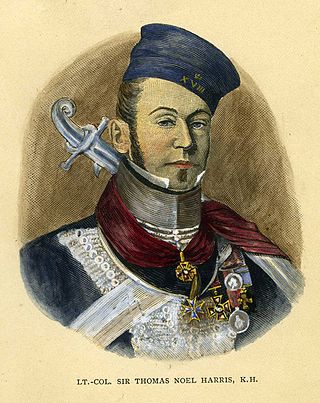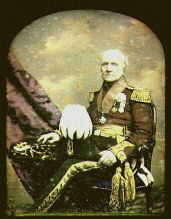Related Research Articles

The King's German Legion was a British Army unit of mostly expatriated German personnel during the period 1803–16. The legion achieved the distinction of being the only German force to fight without interruption against the French during the Napoleonic Wars.

Field Marshal Sir Charles (Carl) August von Alten was a Hanoverian and British soldier who led the famous Light Division during the last two years of the Peninsular War. At the Battle of Waterloo, he commanded a division in the front line, where he was wounded. He later rose to the rank of Field Marshal in the Hanoverian army.

General Baron Hugh Halkett, GCH, CB, was a British soldier during the Napoleonic Wars and later a general of infantry in the Hanoverian service.

Lieutenant-General Sir Henry Clinton was a British Army officer and a general officer during the Napoleonic Wars.

Field Marshal Sir Alexander George Woodford, GCB, KCMG, was a British Army officer. After taking part in the Anglo-Russian invasion of Holland, he served in most of the battles of the Napoleonic Wars. During the Hundred Days he commanded the 2nd battalion of the Coldstream Guards at the Battle of Quatre Bras, the Battle of Waterloo and the storming of Cambrai. He went on to become lieutenant governor and brigade commander at Malta, lieutenant governor and brigade commander at Corfu and then commander of the British garrison on the Ionian Islands before being appointed Governor and Commander-in-Chief of Gibraltar.

Konrad Ludwig Georg Baring was an officer in the army of the Electorate of Hanover and the British army's King's German Legion. Some sources also give his name as Baron Georg(e) von Baring.

General Sir Andrew Francis Barnard was an Irish British Army officer. He served in various capacities in the West Indies, the Cape of Good Hope, Canada, the Netherlands, Sicily, Spain and in the Napoleonic Wars including the Battle of Waterloo for which service he was highly decorated. After his retirement from active duty, he served in a number of civilian positions, being promoted to general four years before his death.
Lieutenant-General Sir James Frederick Lyon was a distinguished officer of the British Army who served as Governor of Barbados from 1829 to 1833.
Colonel James Hawker, C.B. was a British Royal Artillery officer during the Napoleonic Wars.
Charles Best was a British army officer of Hanoverian descent who served in the armies of the East India Company, Britain and Hanover from 1781 until the end of the Napoleonic Wars.

Lieutenant-General Sir George Augustus Quentin (1760–1851) was a Hanoverian British Army officer who fought in the Napoleonic Wars.
William John Lloyd was a British Army officer wounded at the Battle of Waterloo on June 18 1815.
Colonel Sir Thomas Noel Hill KCB KTS was a British Army officer of the Napoleonic Wars who fought at the Battle of Waterloo on 18 June, 1815.

Major-General Sir George Adam Wood CB K.St.V KCH KMT was a British Army officer who served in the Peninsular War and fought at the Battle of Waterloo on 18 June 1815.
Lieutenant-Colonel Thomas Aird was a British Army officer of the Napoleonic era who was present at the Battle of Waterloo on 18 June 1815.

Colonel Sir Thomas Noel Harris was a British Army officer who fought during the Peninsular War and the Waterloo Campaign before finishing his career as Chief Magistrate of Gibraltar. He is notably one of the only British officers to be present at both Leipzig and Waterloo

Lt-General Sir Henry Goldfinch was an officer in the Royal Engineers who served during the Peninsular War of 1807 to 1814, ending his career as one of the colonels commandant of the Corps of Royal Engineers. He was appointed a Companion of the Order of the Bath (CB) in 1815 and a Knight Commander of the Order of the Bath (KCB) in 1852.

Lieut. Col. James Fullarton, C.B., K. H. was a soldier who fought in the Kandyan Wars (1803-1807). During the Peninsula War he fought in the Battle of Corunna (1809) and the Battle of Barrosa (1811). He then went to Holland and in the War of the Sixth Coalition he was sent to attack Merksem and then bombard Antwerp. During the Hundred Days, he fought in the Battle of Waterloo (1815), where he was second in command of the 3rd Battalion, 95th Regiment of Foot, and wounded at Waterloo. He lived the last seven years of his life in Halifax, Nova Scotia.
Freiherr Sigismund Christoph Gustav von Löw von und zu Steinfurth was a Hanoverian general of the Napoleonic Wars who served under the British. He is also known as Sigismund von Löw and Sigismund Baron Low.
Lieutenant-General Henry de Hinuber, known in Hanover as Eduard Christoph Heinrich von Hinüber, was a Hanoverian infantry officer who commanded units of the King's German Legion (KGL) while serving in the British Army during the Napoleonic Wars. Hinuber joined the army of the Electorate of Hanover in 1781, and in 1782 travelled to fight in the Second Anglo-Mysore War in India. He was present at the Siege of Cuddalore and continued on in India until 1792. Promoted to major in 1798, Hinuber served until France invaded Hanover and disbanded the army in 1803.
References
- Christies staff (27 April 1999), "Waterloo 1815 (Lt. Col. Fred. de Wessell, 3rd Line Batt. K.G.L.), original clip and ring suspension, extremely fine (Lot 492 / Sale 1229)", Sale 1229: Orders, Decorations, Campaign Medals and Militaria, Spink London: Christies
- Philippart, John (1820), The Royal military calendar, or Army service and commission book. Containing the services and progress of promotion of the generals, lieutenant-generals, major-generals, colonels, lieutenant-colonels, and majors of the army, according to seniority: with details of the principal military events of the last century, vol. 4, London: Printed by A.J. Valpy, sold by T. Egerton etc, pp. 401–402